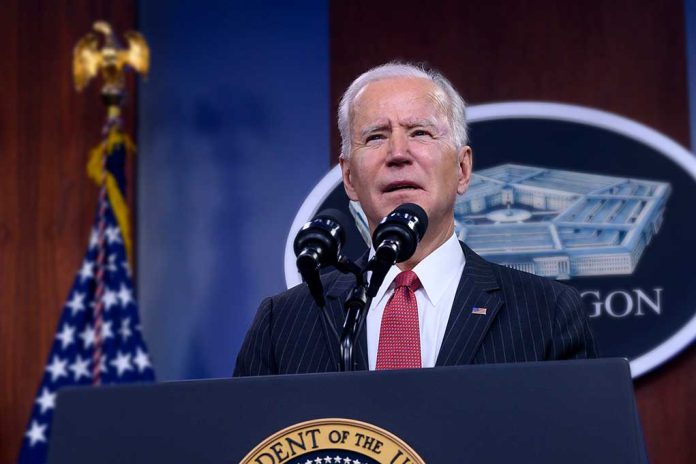
The Biden administration’s decision to end legal status for migrants from Cuba, Haiti, Nicaragua, and Venezuela sparks controversy and raises concerns about potential increases in undocumented border crossings.
At a Glance
- Biden administration will not extend legal status for migrants under CHNV sponsorship program
- 530,000 migrants entered the U.S. under the program since its launch in October 2022
- Migrants must seek other legal options, leave the U.S., or face deportation as two-year legal status expires
- Program suspension follows fraud concerns, though no widespread fraud was found
- Decision draws criticism from both progressive advocates and conservative opponents
Biden Administration Ends CHNV Program
In a move that has ignited debate across the political spectrum, the Biden administration has announced it will not extend the legal status of hundreds of thousands of migrants who entered the United States under the Cuba, Haiti, Nicaragua, and Venezuela (CHNV) sponsorship program. This decision affects a significant number of individuals who were allowed to enter the country legally as part of an initiative designed to reduce illegal border crossings.
The CHNV program, launched in October 2022 for Venezuelans and expanded in January 2023 to include Cubans, Haitians, and Nicaraguans, has allowed up to 30,000 migrants from these countries to enter the U.S. legally each month with financial support from American sponsors. As of August 2023, approximately 530,000 migrants had entered the country under this initiative.
Implications for Migrants and U.S. Immigration Policy
The Department of Homeland Security (DHS) has made it clear that those who have not secured a lawful status or period of authorized stay must leave the United States before their authorized parole period expires. Failure to do so may result in removal proceedings, placing many migrants in a precarious position.
“If you have not sought a lawful status or period of authorized stay, you will need to leave the United States before your authorized parole period expires, or you may be placed in removal proceedings after your period of parole expires,” the government said in a notice to parolees.
This decision stands in contrast to the administration’s approach to Afghan and Ukrainian evacuees, whose parole has been extended. Critics argue that this discrepancy unfairly singles out migrants from the CHNV countries, making them uniquely vulnerable to deportation.
EXCLUSIVE: Internal DHS data reveals the 45+ U.S. cities that hundreds of thousands of migrants have flown into via the Biden administration's controversial "CHNV" mass parole program.
The data was obtained by @HomelandGOP via a subpoena to DHS, and was provided to @FoxNews.
The… pic.twitter.com/Wm6R8QKHTF— Bill Melugin (@BillMelugin_) April 30, 2024
Program Suspension and Fraud Concerns
The CHNV program’s termination follows a period of suspension earlier this year due to fraud concerns raised by the Federation for American Immigration Reform. However, an internal review by DHS found no widespread fraud, with most cases having reasonable explanations for discrepancies.
“Since the inception of the process, a very small number of supporters were found to have fraud or criminal issues warranting referral to law enforcement for investigation and/or appropriate action,” the agency said.
Despite these findings, the DHS is implementing enhanced vetting procedures for U.S.-based financial sponsors, including fingerprint submissions and scrutiny of financial records and criminal backgrounds. These measures aim to strengthen the integrity of the process and protect against potential exploitation of beneficiaries.
Political Reactions and Future Implications
The decision to end the CHNV program has drawn criticism from both sides of the political aisle. Progressive advocates argue that it leaves migrants in legal limbo and vulnerable to deportation, especially in light of former President Trump’s campaign promises regarding immigration policy.
“When Trump is running on promises to revoke legal status & conduct mass deportations, why would the Biden admin force more people into legal limbo?” Andrea Flores, a former Biden administration official, wrote on X. “They re-paroled Afghans & Ukrainians, why single out Venezuelans & make them uniquely vulnerable?”
On the other hand, conservative critics argue that the program circumvented legal immigration processes and should have been terminated entirely. Republican Rep. Mark Green, chairman of the House Homeland Security Committee, stated that the program should never have been implemented in the first place.
The Biden administration will not be extending the legal status of hundreds of thousands of migrants who were allowed to fly to the U.S. under a sponsorship program designed to reduce illegal border crossings. https://t.co/TzIp4T0rrs
— CBS News (@CBSNews) October 7, 2024
The termination of the CHNV program highlights the ongoing challenges in U.S. immigration policy, balancing humanitarian concerns with border security priorities. As the legal status of thousands of migrants hangs in the balance, the debate over immigration reform is likely to intensify in the coming months, particularly as the 2024 presidential election approaches.
Sources:
- U.S. won’t extend legal status for 530,000 migrants who arrived under Biden program
- Biden restarts immigration program for 4 countries with more vetting for sponsors
- Biden Will Allow Legal Permission to Lapse for Migrants From 4 Countries
- Biden to Let Legal Status for Venezuelan Migrants Lapse
- Biden is closing the door on Venezuelans and putting the border at risk
- Biden at the Three-Year Mark: The Most Active Immigration Presidency Yet Is Mired in Border Crisis Narrative














